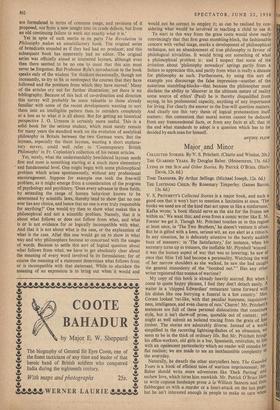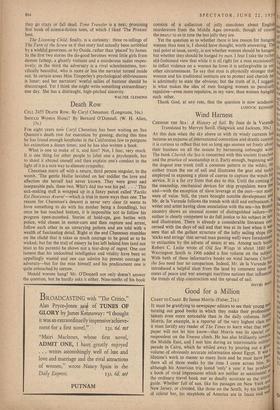Major and Minor
V. S. ParrcuErr's Collected Stories is a major book, and such a good one that it won't hurt to mention a limitation at once. 'The books we need are of the kind that act upon us like a misfortune, Kafka wrote; 'a book should serve as the axe for the frozen sea within us.' We want this; and even from a comic writer like E. M. Forster we get it. Though Mr. Pritchett touches us in this region at least once, in 'The Two Brothers,' he doesn't venture it often. But he is gifted with a keen, serious wit, an eye alert as a robin's. In any situation, he is delicately attentive to the barely audible buzz of manners : in 'The Satisfactory,' for instance, when his secretary turns up in trousers, the ineffable Mr. Plymbell 'winced: it was the human aspect of war that was so lowering; he saw at once that Miss Tell had become a personality. Watching the wag of her narrow shoulders as she walked, he saw she had caught the general immodesty of the "bombed out." ' Has any other writer registered that nuance of wartime? My copy of this book is already heavily scarred. But when I come to quote happy phrases, I find they don't detach easily. A waiter in a 'chipped Edwardian' restaurant 'came forward with his dishes like one hurrying a funeral in a hot country.' Mrs. Coram looked 'rat-like, with that peculiar busyness, inquisitive- ness, intelligence, and even charm of rats.' Charm! Mr. Pritchett'S sentences are full of these personal dislocations that constitute style, but it isn't show-off prose, quotable out of context: you might as well submit an isolated tracing from the grain of fine, timber. The stories are admirably diverse. Instead of a world simplified in the recurring lightning-flashes of an obsession, We seem to be in the thick of ordinary life. But Mr. Pritchett brings his office-workers, old girls in a bar, Spaniards, revivalists, to life with an opalescent particularity which no reader will mistake for flat realism; we are made to see an inexhaustible complexity in the everyday. Naturally, he dwarfs the other storytellers here. The Guarded Years is a book' of efficient tales of wartime imprisonment; Mr; Baber should write more adventures like 'Dark Parting' and eschew love, which turns him mawkish. Mr. Patrick O'Brian likes to write copious landscape prose a la William Sansom and then flabbergast us with a murder or a heart-attack on the last page; but he isn't interested enough in people to make us care when they go crazy or fall dead. Time Transfer is a neat, promising first book of science-fiction tales, of which I liked 'The Proxies best.
The Listening Child, finally, is a curiosity : three re-tellings of The Turn of the Screw as if that story had actually been scribbled by a wishful, governess, or by Ouida, rather than 'placed' by James. In the first two stories the do-good heroines wrest little girls from demon fatheu, a ghostly violinist and a murderous sadist respec- tively; in the third the adversary is a rival schoolmistress, hor- rifically beautiful, who is more or less the narrator turned inside out. In certain areas Miss Timperley's psychological obliviousness is lunar; and her narrators' woeful sallies of humour should be discouraged. Yet I think she might write something extraordinary one day. She has a distraught, high-pitched sincerity.
WALTER CLEMONS



































 Previous page
Previous page